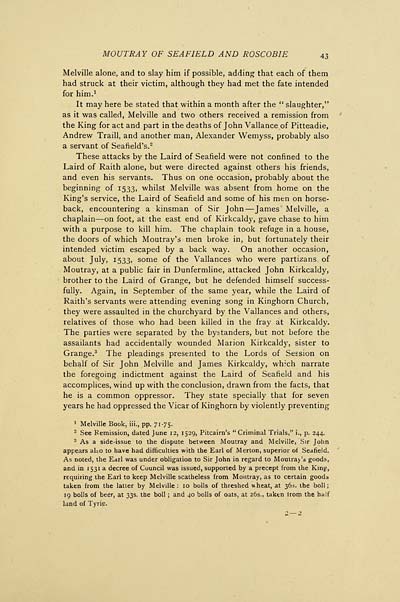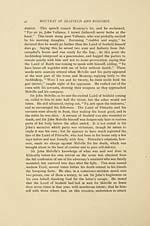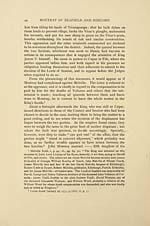Download files
Complete book:
Individual page:
Thumbnail gallery: Grid view | List view

MOUTRAY OF SEAFIELD AND ROSCOBIE 43
Melville alone, and to slay him if possible, adding that each of them
had struck at their victim, although they had met the fate intended
for him. 1
It may here be stated that within a month after the " slaughter,"
as it was called, Melville and two others received a remission from
the King for act and part in the deaths of John Vallance of Pitteadie,
Andrew Traill, and another man, Alexander Wemyss, probably also
a servant of Seafield's. 2
These attacks by the Laird of Seafield were not confined to the
Laird of Raith alone, but were directed against others his friends,
and even his servants. Thus on one occasion, probably about the
beginning of 1533, whilst Melville was absent from home on the
King's service, the Laird of Seafield and some of his men on horse-
back, encountering a kinsman of Sir John — James Melville, a
chaplain — on foot, at the east end of Kirkcaldy, gave chase to him
with a purpose to kill him. The chaplain took refuge in a house,
the doors of which Moutray's men broke in, but fortunately their
intended victim escaped by a back way. On another occasion,
about July, 1533, some of the Vallances who were partizans of
Moutray, at a public fair in Dunfermline, attacked John Kirkcaldy,
brother to the Laird of Grange, but he defended himself success-
fully. Again, in September of the same year, while the Laird of
Raith's servants were attending evening song in Kinghorn Church,
they were assaulted in the churchyard by the Vallances and others,
relatives of those who had been killed in the fray at Kirkcaldy.
The parties were separated by the bystanders, but not before the
assailants had accidentally wounded Marion Kirkcaldy, sister to
Grange. 3 The pleadings presented to the Lords of Session on
behalf of Sir John Melville and James Kirkcaldy, which narrate
the foregoing indictment against the Laird of Seafield and his
accomplices, wind up with the conclusion, drawn from the facts, that
he is a common oppressor. They state specially that for seven
years he had oppressed the Vicar of Kinghorn by violently preventing
1 Melville Book, iii., pp. 71-75.
2 See Remission, dated June 12, 1529, Pitcairn's "Criminal Trials," i., p. 244.
3 As a side-issue to the dispute between Moutray and Melville, Sir John
appears aho to have had difficulties with the Earl of Merton, superior of Seafield.
As noted, the Earl was under obligation to Sir John in regard to Moutray'i goods,
and in 1531 a decree of Council was issued, supported by a precept from the King,
requiring the Earl to keep Melville scatheless from Moutray, as to certain goods
taken from the latter by Melville: 10 bolls of threshed wheat, at 363. the boll;
19 bolls of beer, at 33s. the boll ; and 40 bolls of oats, at 26s., taken Irom the half
land of Tyrie.
2 — 2
Melville alone, and to slay him if possible, adding that each of them
had struck at their victim, although they had met the fate intended
for him. 1
It may here be stated that within a month after the " slaughter,"
as it was called, Melville and two others received a remission from
the King for act and part in the deaths of John Vallance of Pitteadie,
Andrew Traill, and another man, Alexander Wemyss, probably also
a servant of Seafield's. 2
These attacks by the Laird of Seafield were not confined to the
Laird of Raith alone, but were directed against others his friends,
and even his servants. Thus on one occasion, probably about the
beginning of 1533, whilst Melville was absent from home on the
King's service, the Laird of Seafield and some of his men on horse-
back, encountering a kinsman of Sir John — James Melville, a
chaplain — on foot, at the east end of Kirkcaldy, gave chase to him
with a purpose to kill him. The chaplain took refuge in a house,
the doors of which Moutray's men broke in, but fortunately their
intended victim escaped by a back way. On another occasion,
about July, 1533, some of the Vallances who were partizans of
Moutray, at a public fair in Dunfermline, attacked John Kirkcaldy,
brother to the Laird of Grange, but he defended himself success-
fully. Again, in September of the same year, while the Laird of
Raith's servants were attending evening song in Kinghorn Church,
they were assaulted in the churchyard by the Vallances and others,
relatives of those who had been killed in the fray at Kirkcaldy.
The parties were separated by the bystanders, but not before the
assailants had accidentally wounded Marion Kirkcaldy, sister to
Grange. 3 The pleadings presented to the Lords of Session on
behalf of Sir John Melville and James Kirkcaldy, which narrate
the foregoing indictment against the Laird of Seafield and his
accomplices, wind up with the conclusion, drawn from the facts, that
he is a common oppressor. They state specially that for seven
years he had oppressed the Vicar of Kinghorn by violently preventing
1 Melville Book, iii., pp. 71-75.
2 See Remission, dated June 12, 1529, Pitcairn's "Criminal Trials," i., p. 244.
3 As a side-issue to the dispute between Moutray and Melville, Sir John
appears aho to have had difficulties with the Earl of Merton, superior of Seafield.
As noted, the Earl was under obligation to Sir John in regard to Moutray'i goods,
and in 1531 a decree of Council was issued, supported by a precept from the King,
requiring the Earl to keep Melville scatheless from Moutray, as to certain goods
taken from the latter by Melville: 10 bolls of threshed wheat, at 363. the boll;
19 bolls of beer, at 33s. the boll ; and 40 bolls of oats, at 26s., taken Irom the half
land of Tyrie.
2 — 2
Set display mode to:
![]() Universal Viewer |
Universal Viewer | ![]() Mirador |
Large image | Transcription
Mirador |
Large image | Transcription
Images and transcriptions on this page, including medium image downloads, may be used under the Creative Commons Attribution 4.0 International Licence unless otherwise stated. ![]()
| Histories of Scottish families > Moutray of Seafield and Roscobie, now of Favour Royal, Co. Tyrone > (15) Page 43 |
|---|
| Permanent URL | https://digital.nls.uk/94950778 |
|---|
| Description | A selection of almost 400 printed items relating to the history of Scottish families, mostly dating from the 19th and early 20th centuries. Includes memoirs, genealogies and clan histories, with a few produced by emigrant families. The earliest family history goes back to AD 916. |
|---|

